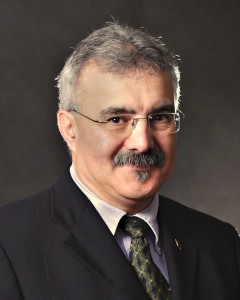By David E. Prince
Andrew Fuller (1754-1815) is best known for his robust defense of the free offer of the gospel to all people. His book, The Gospel Worthy of All Acceptation, influenced William Carey and others, and it can be rightly considered the foundational theological document that helped launched the modern missions movement. The man C.H. Spurgeon referred to as, “The greatest theologian of his century,” was a local church pastor who unceasingly wed doctrine to practice.
In August 1803, Fuller delivered a sermon on “Christian Patriotism” to his congregation at the Baptist Church of Kettering. His sermon, based upon Jeremiah 29:7 (“And seek the peace of the city whither I have caused you to be carried away captives, and pray unto the LORD for it”), sought to help his congregation understand their Christian duty during a time of crisis. Many English citizens feared an imminent French invasion led by Napoléon Bonaparte. As a Particular Baptist dissenter, Fuller spoke about the Christian’s duty as a citizen from the cultural margins of English society and not from a seat of cultural power.
Christians in America are assuming the role of prophetic minority at breakneck speed, and we would do well to heed Fuller’s biblical gospel wisdom. The former conservative Christian Moral Majority voting block is a relic of a bygone era. Fuller’s biblical call to serve the kingdom of Christ as good citizens who seek the welfare of our country transcends whether we like or dislike the current governmental regime.
According to Fuller, seeking the welfare of our nation means we must have the courage to pursue justice and speak out about governmental faults, but though we must complain, we must not become complainers. And when we do speak out against the ruling authority, we should do so with both regret and respect. Consider some helpful portions of Fuller’s sermon I have excerpted below:
We ought to be patriots, or lovers of our country.
Seek the peace of the city. The term rendered peace signifies not merely an exemption from wars and insurrections, but prosperity in general. It amounts, therefore, to saying, seek the good or welfare of the city. Such, brethren, is the conduct required of us, as men and as Christians. We ought to be patriots, or lovers of our country.
If my country cannot prosper but at the expense of justice, humanity, and the happiness of mankind, let it be unprosperous!
To prevent mistakes, however, it is proper to observe that the patriotism required of us is not that love of our country, which clashes with universal benevolence, or which seeks its prosperity at the expense of the general happiness of mankind. Such was the patriotism of Greece and Rome; and such is that of all others where Christian principle is not allowed to direct it. Such, I am ashamed to say, is that with which some have advocated the cause of Negro slavery. It is necessary, forsooth, to the wealth of this country! No; if my country cannot prosper but at the expense of justice, humanity, and the happiness of mankind, let it be unprosperous!
Oh my country, I will lament thy faults! Yet, with all thy faults I will seek thy good
The prosperity which we are directed to seek in behalf of our country involves no ill to anyone, except to those who shall attempt its overthrow. Let those who fear not God, nor regard man, engage in schemes of aggrandizement, and let sorted parasites pray for their successes. Our concern is to cultivate that patriotism which harmonizes with good-will to men. Oh my country, I will lament thy faults! Yet, with all thy faults I will seek thy good; not only as a Briton, but as a Christian: "for my brethren and companions sakes, I will say, Peace be within the: because of the house of the Lord my God, I will seek thy good!"
A dutiful son may see a fault in a father; but he will not take pleasure in exposing him
If we seek the good of our country, we shall certainly do nothing, and join in nothing, that tends to disturb the peace, or hinder its welfare. Whoever engages in plots and conspiracies to overthrow its constitution, we shall not. Whoever deals in inflammatory speeches, or in any manner sows the seeds of discontent and disaffection, we shall not. Whoever labors to deprecate its governors, supreme or subordinate, in a manner tending to bring government itself into contempt, we shall not.
Even in cases wherein we may be compelled to disapprove of measures, we shall either be silent, or express our disapprobation with respect and with regret. A dutiful son may see a fault in a father; but he will not take pleasure in exposing him. He that can employ his wit in degrading magistrates is not their friend, but their enemy; and he that is an enemy to magistrates is not far from being an enemy to the magistracy, and, of course, to his country. A good man may be aggrieved; and, being so, may complain. Paul did so at Philippi. But the character of a complainer belongs only to those who walk after their own lusts.
It becomes Christians to bear positive good-will to their country, and to its government, considered as government
If we seek the good of our country, we shall do everything in our power to promote its welfare. We shall not think it sufficient that we do it no harm, or that we stand still as neutrals, in its difficulties. If, indeed, our spirits be tainted with disaffection, we shall be apt to think we do great things by standing aloof from conspiracies, and refraining from inflammatory speeches; but this is no more than maybe accomplished by the greatest traitor in the land, merely as a matter of prudence. It becomes Christians to bear positive good-will to their country, and to its government, considered as government, irrespective of the political party which may have the ascendancy.
In cases of imminent danger, shall be willing to expose even our lives in its defense
We may have our preferences, and that without blame; but they ought never to prevent the cheerful obedience to the laws, a respectful demeanor towards those who frame and those who execute them, or a ready co-operation in every measure which the being or well-being of the nation may require. The civil power, whatever political party is uppermost, while it maintains the great ends of government, ought, at all times, to be able to reckon upon religious people as its cordial friends; and if such we be, we shall be willing, in times of difficulty, to sacrifice private interest to public good; shall contribute of our substance without murmuring; and, in cases of imminent danger, shall be willing to expose even our lives in its defense.
[The Complete Works of Andrew Fuller, vol. 1, ed. Joseph Belcher (Sprinkle publications): 204-205.]
This article originally appeared at the Ethics and Religious Liberty website on March 6, 2015. http://erlc.com/article/a-christians-duty-to-county-and-the-injustice-of-racism-lessons-from-andrew
_____________
 David E. Prince is the Pastor of Preaching and Vision at Ashland Avenue Baptist Church in Lexington, KY.
David E. Prince is the Pastor of Preaching and Vision at Ashland Avenue Baptist Church in Lexington, KY.
 It is deeply encouraging to find Christian historians and authors beginning to recognize the important role played by women in the history of God’s people, and pen both popular and more academic studies of this important subject. This recent book by Richard Hannula, the principal of a Christian High School in Tacoma, Washington, is a popular approach written especially for young people. It sketches the lives of some fifty Christian women. Some are well-known, like Perpetua and Monica, Sarah Edwards and Edith Schaeffer, while others, like Erdmuth von Zinzendorf and Bilquis Sheikh, are little known. But all of them, through Hannula’s adroit hand, have something to teach present-day believers. The life of Lady Jane Grey, for example, reveals a “sturdy faith in Christ” and a robust grasp of the vital truths at the heart of the Reformation (p.132). Eta Linnemann, a twentieth-century German higher critic, who was converted from liberal theology, reveals the bankruptcy of such theology and the necessity of the new birth (p.304–307). Particularly helpful about the women chosen for this book is that they come from a variety of ethnic backgrounds, a good representation of the globalization of the Christian faith in the past two hundred years.
It is deeply encouraging to find Christian historians and authors beginning to recognize the important role played by women in the history of God’s people, and pen both popular and more academic studies of this important subject. This recent book by Richard Hannula, the principal of a Christian High School in Tacoma, Washington, is a popular approach written especially for young people. It sketches the lives of some fifty Christian women. Some are well-known, like Perpetua and Monica, Sarah Edwards and Edith Schaeffer, while others, like Erdmuth von Zinzendorf and Bilquis Sheikh, are little known. But all of them, through Hannula’s adroit hand, have something to teach present-day believers. The life of Lady Jane Grey, for example, reveals a “sturdy faith in Christ” and a robust grasp of the vital truths at the heart of the Reformation (p.132). Eta Linnemann, a twentieth-century German higher critic, who was converted from liberal theology, reveals the bankruptcy of such theology and the necessity of the new birth (p.304–307). Particularly helpful about the women chosen for this book is that they come from a variety of ethnic backgrounds, a good representation of the globalization of the Christian faith in the past two hundred years.

 Steve Weaver serves as a Teaching and Research Associate with the Andrew Fuller Center for Baptist Studies and is a fellow of the Center. He also serves as senior pastor of Farmdale Baptist Church in Frankfort, KY. Steve and his wife Gretta have six children between the ages of 4 and 16.
Steve Weaver serves as a Teaching and Research Associate with the Andrew Fuller Center for Baptist Studies and is a fellow of the Center. He also serves as senior pastor of Farmdale Baptist Church in Frankfort, KY. Steve and his wife Gretta have six children between the ages of 4 and 16. Michael A.G. Haykin is the director of the Andrew Fuller Center for Baptist Studies. He also serves as Professor of Church History and Biblical Spirituality at Southern Baptist Theological Seminary. Dr. Haykin and his wife Alison have two grown children, Victoria and Nigel.
Michael A.G. Haykin is the director of the Andrew Fuller Center for Baptist Studies. He also serves as Professor of Church History and Biblical Spirituality at Southern Baptist Theological Seminary. Dr. Haykin and his wife Alison have two grown children, Victoria and Nigel.

 Evan Burns (Ph.D. candidate, The Southern Baptist Theological Seminary) is on faculty at Asia Biblical Theological Seminary, and he lives in Southeast Asia with his wife and twin sons. They are missionaries with Training Leaders International. He also works as the Director of the M.A. in Global Leadership program at Western Seminary.
Evan Burns (Ph.D. candidate, The Southern Baptist Theological Seminary) is on faculty at Asia Biblical Theological Seminary, and he lives in Southeast Asia with his wife and twin sons. They are missionaries with Training Leaders International. He also works as the Director of the M.A. in Global Leadership program at Western Seminary.
 David E. Prince is the Pastor of Preaching and Vision at
David E. Prince is the Pastor of Preaching and Vision at 





